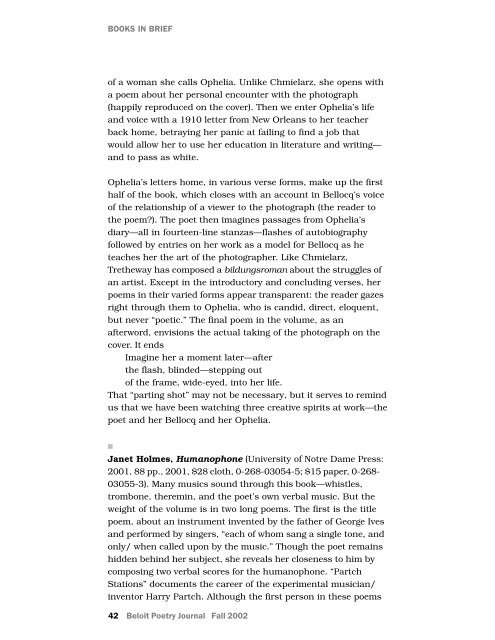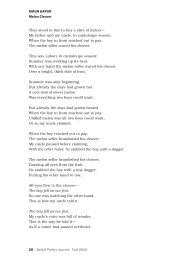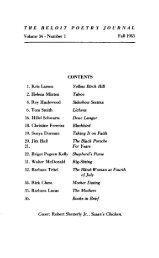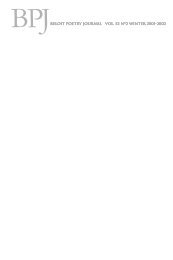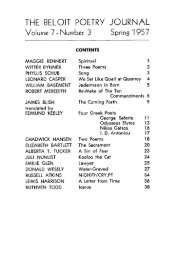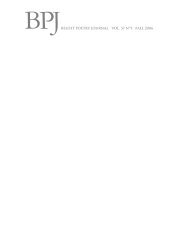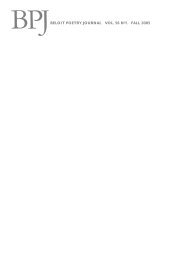You also want an ePaper? Increase the reach of your titles
YUMPU automatically turns print PDFs into web optimized ePapers that Google loves.
BOOKS IN BRIEF<br />
of a woman she calls Ophelia. Unlike Chmielarz, she opens with<br />
a poem about her personal encounter with the photograph<br />
(happily reproduced on the cover). Then we enter Ophelia’s life<br />
and voice with a 1910 letter from New Orleans to her teacher<br />
back home, betraying her panic at failing to find a job that<br />
would allow her to use her education in literature and writing—<br />
and to pass as white.<br />
Ophelia’s letters home, in various verse forms, make up the first<br />
half of the book, which closes with an account in Bellocq’s voice<br />
of the relationship of a viewer to the photograph (the reader to<br />
the poem?). The poet then imagines passages from Ophelia’s<br />
diary—all in fourteen-line stanzas—flashes of autobiography<br />
followed by entries on her work as a model for Bellocq as he<br />
teaches her the art of the photographer. Like Chmielarz,<br />
Tretheway has composed a bildungsroman about the struggles of<br />
an artist. Except in the introductory and concluding verses, her<br />
poems in their varied forms appear transparent: the reader gazes<br />
right through them to Ophelia, who is candid, direct, eloquent,<br />
but never “poetic.” The final poem in the volume, as an<br />
afterword, envisions the actual taking of the photograph on the<br />
cover. It ends<br />
Imagine her a moment later—after<br />
the flash, blinded—stepping out<br />
of the frame, wide-eyed, into her life.<br />
That “parting shot” may not be necessary, but it serves to remind<br />
us that we have been watching three creative spirits at work—the<br />
poet and her Bellocq and her Ophelia.<br />
■<br />
Janet Holmes, Humanophone (University of Notre Dame Press:<br />
2001, 88 pp., 2001, $28 cloth, 0-268-03054-5; $15 paper, 0-268-<br />
03055-3). Many musics sound through this book—whistles,<br />
trombone, theremin, and the poet’s own verbal music. But the<br />
weight of the volume is in two long poems. The first is the title<br />
poem, about an instrument invented by the father of George Ives<br />
and performed by singers, “each of whom sang a single tone, and<br />
only/ when called upon by the music.” Though the poet remains<br />
hidden behind her subject, she reveals her closeness to him by<br />
composing two verbal scores for the humanophone. “Partch<br />
Stations” documents the career of the experimental musician/<br />
inventor Harry Partch. Although the first person in these poems<br />
42 <strong>Beloit</strong> <strong>Poetry</strong> <strong>Journal</strong> Fall 2002


